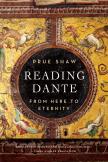Abandon Hope?
A basic Dante bibliography would now run in excess of 50,000 items; something new appears on the list every day. So why would Prue Shaw add yet another introduction, albeit one with a droll cinematic subtitle, to the Divine Comedy?—because she holds that the “sacred poem,” notwithstanding what she calls its antiquated theology and erroneous science, illumines the individual’s role in society and the cosmos, even for readers who do not share Dante’s medieval Catholicism or his “hierarchical and judgmental” view of good and evil actions.
Shaw considers seven themes in that moral universe: friendship, power, life, love, time, numbers and words, and devotes a chapter to each. These thematic chapters are capacious, each developed as a graceful if somewhat miscellaneous narrative. Five additional sections provide information about the dramatis personae, the poem’s meter, a glossary, an outline of the principal events in Dante’s life and suggested further readings. Academics can admire the competence with which Shaw popularizes received scholarship; novices can benefit from the pedagogical guidance provided by her very British classroom analogies. Both professional and amateur Dantisti can find in her numerous asides inexhaustible matters to ponder and feel when reading Il Summo Poeta.
Commencing on Good Friday Eve in the momentous year 1300, La Commedia is about a visionary three-day journey to the three realms of the afterlife, where the pilgrim poet speaks to and learns, primarily about the meaning of the journey itself, from the damned in the inferno, the repentant in purgatory and the blessed in paradise. The poem begins with Dante’s famous description of himself as lost, at the biblical midpoint of life, age 35, in a fearfully dark place. What led him to abandon “the straight and true way?” It would seem, above all, frustrated ambition—civic but also poetic—played out in and against an intellectually and artistically vibrant, wealthy, turbulent Florence. In the Commedia, Florence is violently unstable morally as well as politically: pride, envy and greed inflame rivalries into bloody conflicts between the citizens. Of the 36 Florentines Dante meets in the afterlife, 30 are in hell, four in purgatory, and only two in paradise.
Dante’s own catastrophic fall from the Florentine political summit came on Jan. 27, 1302, when, on trumped-up charges of financial corruption, he and other tepidly papalist White Guelfs were exiled. Dante never returned to Florence; he lived for almost 20 years as an “undeserved exile” under a twice-imposed death sentence. Moving about Italy from court to court, supported by patrons, Dante was, in his own self-pitying words, “a wanderer almost a beggar.”
Written during those interminable years of exile (c. 1308–20), the Commedia is peopled with rival poets and self-serving, vicious political actors. The poets, those shown as obliquely confirming Dante’s artistic pre-eminence, fare better than the politicians. Dante’s ingeniously executed denunciations of avaricious, simoniacal popes, power-voracious kings and treacherous nobles are devastatingly direct, mouthed post-mortem by the suffering miscreants—bringing judgment, or expiation, or damnation on themselves, their descendants and their still living companions in crime. The underlying theme of the Commedia is that in this life politics seems to be all, but in the afterlife it is assuredly not. The overriding theological truth is that God transcends human politics, even the pope’s putative power to bind in heaven as well as on earth.
Was Dante, “fiery and uncompromising,” also a medieval bigot and a rigidly dogmatic moral scold? Shaw thinks that Dante’s “moral certainties” do not blind him to the ambiguities of “real human behavior in a real human world.” So we can continue to learn from the Commedia about the human condition in today’s secularized world. But is it as easy as Shaw suggests to abstract contemporary metaphysical, moral and psychological universals from the particular “supernatural economy”—widely regarded as unbelievable or even unintelligible fantasy—of the Commedia?
My undergraduates would query who today can really believe that “history [is] a single, purposeful sequence of events,” or that the natural and human world is evidently “Trinitarian”? But these are questions too grand to charge an introduction to raise much less answer carefully. Still, Shaw mentions T. S. Eliot, that Old Christian Possum, who slyly observed that even those who have never read Dante know his famous bottom line, “And in His will is our peace.” Shaw knows the line but treats it en passant, content to nod at its “grandeur,” reticent to defend or criticize its truth. That nod makes a theologically abstinent reading of Dante easier for Shaw than for many post-Christian, secularist readers. Dante’s own culturally particular beliefs—which allow God’s justice to dominate brutally above and over things human—separate him from current religiosity as well as from contemporary nonbelievers.
For those readers, Shaw identifies a different bottom line: “Political power is transient, but art endures; the poet trumps the pope.” Calling it a “paradox,” Shaw delicately allows or perhaps hopes that some similitude to divine transcendence remains experientially intelligible in a religiously disenchanted world: “To nonbelievers, it must be because aesthetic value transcends or defeats time.” Everything rests on that must. In Dante’s neo-Platonist chain of being, the poetry of human making must depend on the theology of divine creating: human art follows nature; nature follows the divine intellect. In an arresting metaphor, Virgil encapsulates Dante’s understanding of art: human art is “almost God’s grandchild.” A this-worldly “religion of art,” wherein the human experience of universal aesthetic value substitutes for the transcendence of an imperious moral divinity, contradicts what Dante affirms. Once, Shaw puts Dante’s point more bluntly than Dante himself: “God is more important than poetry.” Yet, in her celebration of Dante’s poetic virtuosity, Shaw subtly asks, “Is He?”
This article also appeared in print, under the headline “Abandon Hope?,” in the April 6, 2015, issue.








